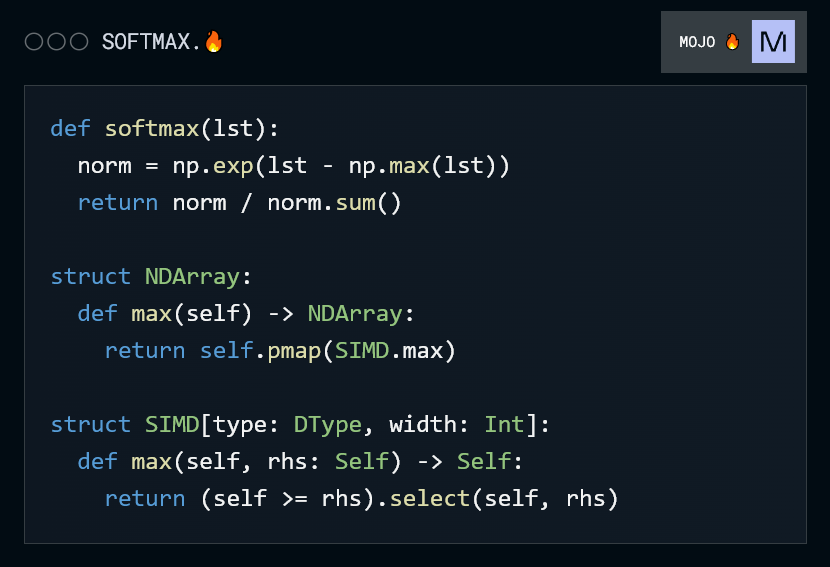Introduction
Python has become the de facto programming language in the field of artificial intelligence (AI) and machine learning (ML) due to its simplicity, flexibility, and rich ecosystem. However, Python’s current implementation, CPython, faces several limitations when it comes to systems programming and performance, giving rise to the ‘two-world problem’ where Python and low-level languages like C and C++ must coexist to achieve high performance.
Mojo: Unifying Systems Programming and AI/ML Development
Mojo is a new programming language designed to address these challenges, seamlessly integrating with the existing Python ecosystem and providing a solution that unifies systems programming and AI/ML development. Mojo aims to leverage Python’s strengths while overcoming its performance limitations, and accommodating the growing complexity of heterogeneous hardware accelerators and deployment challenges.
Mojo’s Key Features and Compatibility
Mojo is designed to be fully compatible with the Python ecosystem, allowing developers to run existing Python 3 code ‘out of the box’ using CPython’s runtime. This ensures full compatibility with the entire Python ecosystem, while also enabling a smooth migration path for Python code to Mojo.
Mojo is a powerful programming language designed as a superset of Python, with features such as:
- Strong Type Checking: Mojo allows you to employ strong type checking using its
structtypes. This ensures that the correct data types are used and provides compile-time errors for any mismatches. - Overloaded Functions: Mojo supports overloaded functions and methods, allowing you to define multiple functions with the same name but different arguments.
- Stricter Function Declarations (fn): The
fndeclaration is a stricter version of thedefdeclaration. While bothfnanddefare interchangeable on an interface level,fnenforces more restrictions in its body, making it suitable for systems programming.
These enhancements provide more control, predictability, and safety in code, making Mojo particularly suitable for systems programming and AI/ML development.
Mojo’s Compatibility with the Python Ecosystem
To further facilitate migration, Mojo provides a mechanical migrator that offers high compatibility, allowing developers to progressively move their code to Mojo. This approach is inspired by the successful migration from Objective-C to Swift performed by Apple.
Motivation Behind Mojo
The primary motivation for developing Mojo is to bring an innovative programming model to accelerators and other heterogeneous systems commonly found in AI and ML. With the increasing complexity and variety of hardware accelerators, there is a pressing need for a unified platform that can accommodate these diverse requirements.
Mojo’s design aims to provide a seamless integration with Python’s ecosystem while addressing the performance limitations of CPython. By doing so, Mojo has the potential to revolutionize AI/ML development and improve performance across the board.
Strong Type Checking in Mojo
Mojo allows you to employ strong type checking using its struct types. This ensures that the correct data types are used and provides compile-time errors for any mismatches.
def pairTest() -> Bool:
let p = MyPair(1, 2)
# Uncomment to see an error:
# return p < 4 # gives a compile time error
return True
Overloaded Functions in Mojo
Mojo supports overloaded functions and methods, allowing you to define multiple functions with the same name but different arguments.
struct Complex:
var re: F32
var im: F32
fn __init__(self&, x: F32):
self.re = x
self.im = 0.0
fn __init__(self&, r: F32, i: F32):
self.re = r
self.im = i
Stricter Function Declarations (fn) in Mojo
The fn declaration is a stricter version of the def declaration. While both fn and def are interchangeable on an interface level, fn enforces more restrictions in its body, making it suitable for systems programming.
fn pairTest() -> Bool:
let p = MyPair(1, 2)
return True
Conclusion
Mojo extends Python’s capabilities by offering strong type checking, overloaded functions, and a stricter alternative to the def declaration. These features cater to the needs of systems programmers and developers who seek more control, predictability, and safety in their code.
By providing a unified platform for AI/ML development, Mojo has the potential to revolutionize this field and improve performance across the board. With its seamless integration with Python’s ecosystem, Mojo is poised to become a game-changer in the world of AI/ML development.



